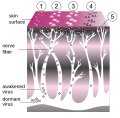File:A Course of Shingles diagram.svg
Jump to navigation
Jump to search

Size of this PNG preview of this SVG file: 488 × 477 pixels. Other resolutions: 246 × 240 pixels | 491 × 480 pixels | 786 × 768 pixels | 1,048 × 1,024 pixels | 2,095 × 2,048 pixels.
Original file (SVG file, nominally 488 × 477 pixels, file size: 332 KB)


